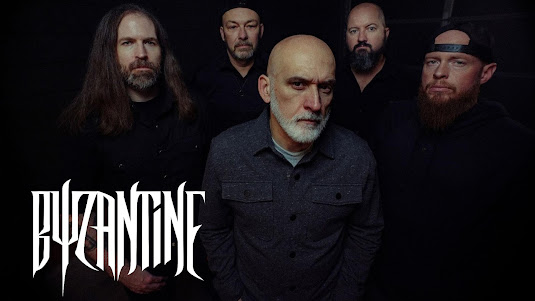Byzantine, formed in 2000 in Charleston, West
Virginia, has long existed on the periphery of the New Wave of American Heavy
Metal. While many contemporaries reached wider commercial heights, Byzantine
remained a cult force—respected for their precision, creativity, and
persistence. Led by Chris Ojeda (vocals/rhythm guitar) and joined by Brian
Henderson (lead guitar/vocals), Tony Rohrbough (guitar), Ryan
Poslethwait (bass/vocals), and Matt Bowles (drums), the band has
built a reputation on refusing to follow mainstream trends, instead forging a
personal sound rooted in groove, technicality, and honest aggression.
Their early
material—such as "The Fundamental Component" (2004) and "...And
They Shall Take Up Serpents" (2005)—carried the DNA of Bay Area thrash,
southern crunch, and progressive ambition. After 2007's "Oblivion
Beckons", internal disruption forced a temporary disbandment. The
reformation yielded self-released albums, most notably "To Release Is To
Resolve" (2015), which saw unexpected success for an independent act,
charting strongly and reigniting fan interest. Their subsequent release on Metal
Blade, "The Cicada Tree" (2017), further expanded their hybrid
approach and affirmed their position as genre outsiders with something personal
to say.
"Harbingers"
arrives as a culmination of what Byzantine has been shaping for over two
decades. Clocking in at 45 minutes across nine tracks, the album neither
overstays its welcome nor feels rushed. It manages to feel fully realized
without being overinflated. Produced by Peter Wichers, the sound has
weight, allowing detailed rhythm interplay and layered vocals without losing
intensity. The production respects the band's complex identity without turning
the mix into sterile compression or reducing the human touch that has always
underpinned their music.
Thematically,
the album is structured around collapse—both technological and political—as
well as the fractured search for peace or meaning in a destabilized world.
Tracks like "Floating Chrysanthema," with its narrative of AI
ascendancy, and "The Unobtainable Sleep," with its poetic lament on
the nature of finality, suggest a mature lyrical direction that avoids broad
generalizations in favor of emotionally grounded, specific visions.
Vocally, Chris Ojeda sounds seasoned but vital. His range isn’t theatrical, but it’s focused and forceful. Harmony vocals by Brian Henderson provide moments of contrast without falling into overused melodic tropes. There’s a restraint in the way Byzantine applies melody—enough to give dimension, never enough to dilute the core aggression.
Guitar work
throughout is precise yet organic. The interplay between Ojeda, Henderson,
and returning member Tony Rohrbough offers a multi-angled approach to
riff construction. Changes in rhythm and tempo are natural and fluid, never
abrupt for the sake of disorientation. The guest solos by Andrey
Gadzhibalaev and Rohrbough are expressive without descending into
indulgence, reinforcing rather than distracting from the musical direction.
The rhythm
section—Ryan Poslethwait and Matt Bowles—locks in tightly but
avoids mechanical repetition. Bowles’ drumming supports the dynamic
shifts with sharp precision, especially when navigating complex meters or
slower dirge-like passages. The bass tone, often overlooked in this style, is
present and textured, lending an extra layer of weight.
The album’s
title track, "Harbinger," articulates social critique without veering
into didacticism. Its vocal layering and instrumental interplay express
frustration not through outrage but through tension and structural escalation.
It typifies the album’s broader attitude: not explosive, but corrosive—slowly,
steadily wearing down the listener’s sense of predictability.
"Harbingers"
doesn’t seek to appeal to trends or posture for broader visibility. It reflects
a seasoned band finally comfortable with its identity, reconnected with one of
its original architects, and determined to create music that speaks honestly
within their framework. The result is an album that feels solid, thoughtfully
executed, and long overdue for recognition beyond its underground following.
Score: 8.0







No comments:
Post a Comment